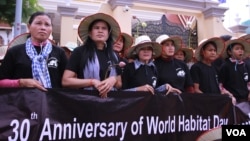Despite the presence of barricades and riot police, more than 1,000 evictees, human rights campaigners, land activists and Buddhist monks celebrated the 30th annual World Habitat Day in Phnom Penh on Monday.
Rights groups say the government has failed to give compensation and prevent the victims of forced evictions from being dragged into poverty.
According to a recent report from rights group Adhoc, the number of people who have become involved in land disputes has risen to 770,000 over the past 13 years. Most of those are victims of forced evictions and land grabbing.
Another report from Licadho found that roughly 2.2 million hectares of land across Cambodia were provided to private companies in the form of land concession for development, which are a major source of forced evictions and land conflict in the poverty-stricken country.
Gathering in front of the National Assembly on Monday morning, victims of land grabs called on lawmakers and relevant ministries to help them solve their struggles and put an end to evictions in Cambodia.
Sou Srey Neang, who was displaced last month by the National Road 5 expansion near Phnom Penh's Prek Pnov commune, complained that the municipal authorities seized her belongings and destroyed her family houses. She added that the authorities were rude in their dealings with her, and provided little compensation to her family, which has led to her and her family living without a roof.
“The assets in my house, which I had lived and worked in for over 35 years doing a small vending business, were seized with nothing left behind. Even the mosquito net and mat were seized. My children’s house was bulldozed to the ground while mine was disassembled and the assets were taken away,” Srey Neang said, addressing the demonstration through a loudspeaker.
“Every day I live under direct sunlight and rain. My business is gone. For over a month we have been living with nothing left. I live in misery, and every night I cannot sleep because the house isn’t enclosed. I sleep very little.
“Did they do the right thing? Please, everyone, open your eyes!”
Soum Kry, a resident living near a railroad in Phnom Penh, who also joined the event on Monday morning, told VOA Khmer that she is concern about being evicted due to development projects and ongoing railroad renovation works.
“I am worried that they will force us out of our home. We would have to live far away from school, from the market, and we would not have any shelter for our children and grandchildren,” said Soum Kry.
More than 1,000 demonstrators arrived at the National Assembly after a short march from the area formerly occupied by the Dey Krahorm Community, where residents were violently evicted in 2009.
Clad in black t-shirts bearing the words “Rights To Housing,” the participants carried symbolic paper houses.
The protesters’ petitions were received by officials from the National Assembly, but they were prevented from leaving the area in front of the country’s parliament.
Speaking to reporters in front of the National Assembly, Sia Phirum director of Housing Rights Task force—which works closely with the victims of forced evictions and land conflicts—said that the lack of political will, corruption among government officials and the shortcomings of the court system were the main obstacles to providing justice to the victims of land rights abuses.
“We can see that corruption makes it very difficult and I believe that even the government is also trying very hard themselves,” he said. “However, we can see that corruption still remains due to the limitations of the standards of our system.”
Am Sam Ath, investigation supervisor at Licadho, told VOA Khmer that the Cambodian government had violated freedom of speech and assembly during the demonstration by deploying riot police and barricades around the National Assembly and preventing the marchers from visiting other ministries.
“With the scenes we saw this morning, we can see that even though there was permission to celebrate, they deployed barricades, and used a plethora of forces,” he said.
Officials at Municipal Hall and other related ministries could not be reached for comment about the demonstration.
VOA Khmer's Khan Sokummono contributed to this report.







